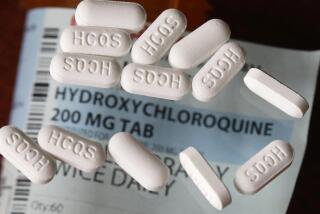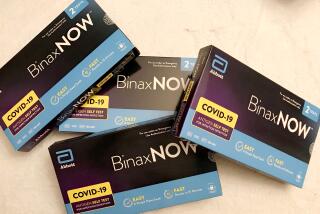Rules for Doctors’ Office Labs May Ease : Medicine: The White House seeks physicians’ support for its health reform program. But some in Congress are likely to oppose the change.
WASHINGTON — In another attempt to elicit physician support for health care reform, the White House wants to exempt 85,000 small testing labs in doctors’ offices from regulations designed to root out shoddy practices, sources said Tuesday.
Such deregulation is certain to prove popular among doctors, who blame the regulations, defined in the Clinical Laboratory Improvements Amendments, for driving up operating costs and imposing onerous administrative burdens.
But any attempt to gut the 1988 law is equally likely to face strong opposition from its bipartisan congressional sponsors, including Sens. Barbara A. Mikulski (D-Md.) and William S. Cohen (R-Me.) and Reps. John D. Dingell (D-Mich.) and Ron Wyden (D-Ore.).
The potential flap also highlights the difficult balancing act confronting the White House as it seeks to woo competing interest groups to back President Clinton’s health care reform agenda.
No courtship has been more delicate than that between the White House and the American Medical Assn., which represents nearly half the nation’s 600,000 doctors.
Senior Administration officials are well aware that, if the President’s agenda is to succeed, he needs broad physician support. But such backing will not come easily, as the AMA has demonstrated.
Strenuous physician objections already have sent Administration planners back to the drawing board on proposals to impose price controls and malpractice reform.
Yet in striving to please the doctors, the White House also risks offending consumer advocacy groups and the nation’s trial lawyers, who are among the heaviest financial contributors to members of Congress--and to Clinton’s 1992 presidential bid.
Relations between the AMA and the Administration got off to a rocky start in late January after Clinton created the White House Task Force on National Health Care Reform and its chairwoman, First Lady Hillary Rodham Clinton, excluded doctors and other medical interest groups from participation in the drafting of a reform agenda.
Those tensions were eased only after Ira Magaziner, the senior White House policy adviser who worked with the task force, met repeatedly with top AMA officers.
One congressional analyst insisted that Dingell “would not support” any weakening of the regulations on testing labs. But others were less certain about the outcome of an Administration attempt to deregulate lab supervision.
“Some members (of Congress) are going to fight very hard against any rollback,” one health care attorney and lobbyist said. “But there’s going to be a lot of deals cut in health care reform and maybe there’s something else they (backers of the regulations) want. Who knows?”
Enacted in 1967, the law created a confusing patchwork of regulations to govern most testing labs--but left untouched those run by doctors in their own offices.
In the wake of news stories on shoddy practices in some of those labs, particularly involving errors in Pap smears, which are taken to detect cancer of the uterus, Congress in 1988 enacted a series of amendments that subjected all labs, regardless of size, to the same regulations and standards. Their personnel must, for example, pass proficiency tests and the labs must pay registration fees ranging from a few hundred to several thousand dollars.
Mrs. Clinton alluded to the Administration’s intention to deregulate lab supervision during an address Sunday at the AMA annual meeting in Chicago, when she cited the current regulations as a prime example of excessive government micromanagement of physicians. The remark drew a rousing response from her audience.
But details of the plan were delivered separately to AMA leaders in a private meeting with Magaziner.
The Administration intends to eliminate proficiency testing and registration fees for about 75,000 small office labs and to exempt another 10,000 physician labs that only conduct routine tests for physical exams, say the notes of some who met with Magaziner.
They also quoted Magaziner as saying that quality assurance standards would be “simplified,” although the stringent Pap smear requirements, as enacted in 1988, would be retained.
Industry officials said there are about 12,000 state-of-the-art, free-standing or hospital-based labs around the country. But the number of small office labs run by doctors is elusive; the AMA puts that number at between 100,000 and 300,000. Many doctors fall in this category because they do automated blood tests or routine urinalysis, an AMA official said.
More to Read
Sign up for Essential California
The most important California stories and recommendations in your inbox every morning.
You may occasionally receive promotional content from the Los Angeles Times.










